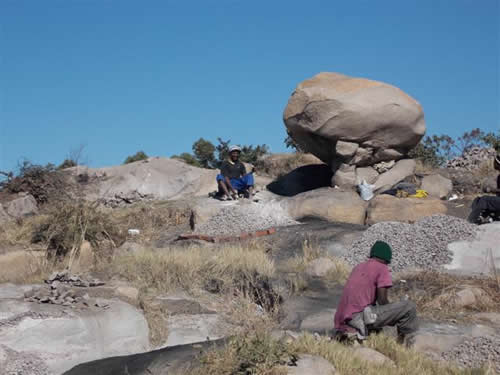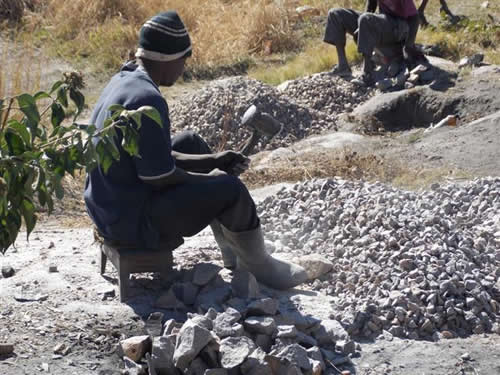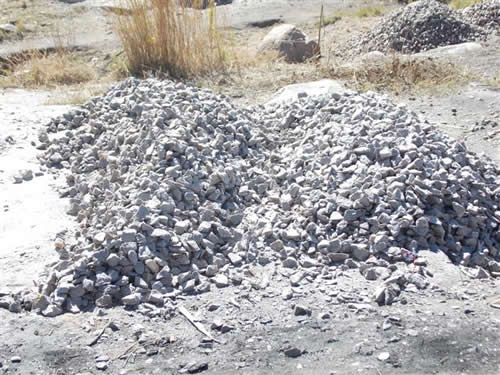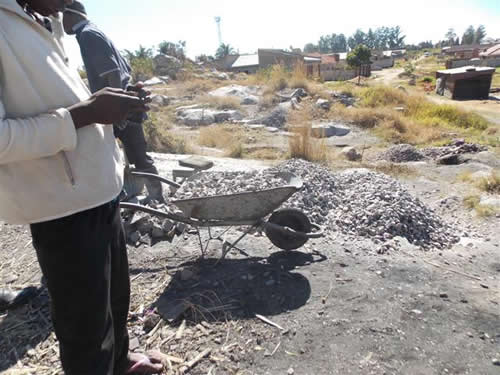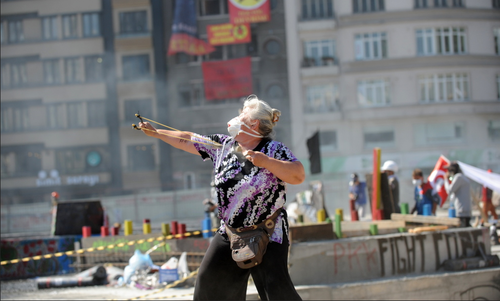Hay Festival 2013: NoViolet Bulawayo returns to her homeland
I am a proper jumble of emotions as I make my way from the Ethiopian Airlines plane into the arrivals lounge of Harare International Airport. It is only a brief distance, it being a small building, but the 13 years I’ve been away from home makes it feel like the longest and most difficult walk I can remember. Part of what weighs on me is that the way I had imagined this day, the way I had played it over and over in my head, the way I had fantasised it years and years ago, was different. Like, over there, on the second floor where family and friends wait to greet their loved ones, would be my father, my Pops, chest swelling with enough pride to make him explode, waiting to welcome his daughter. And with him of course the whole mkhamandolo – all his surviving nine children and their children, the extended family, some of the sons and daughters of my grandfather and his four wives, all my people, drunken on pride and joy – weeping like they’d wept that December 31 1999, when I left, but this time tears of happiness, of course, shrieks of laughter all over, handshakes and hugs, songs and stories.
But then the reality is nothing like I had imagined. In reality I walk alone like a true prodigal. I am coming like some disaster: unexpected, unawaited. Not a single soul at the airport could tell you my name if you paid them. Besides Knockout Thabs, my best friend from high school who is picking me up from the airport, nobody knows of my return. My homecoming will be a surprise – the whole surprise thing being something I never knew before I left Zimbabwe and have picked up during my stay in the US, like so many foreign tendencies that now make up my identity. Oh how it ticked me off, the surprise thing, when I first moved to the US: surprise birthday parties, surprise present, surprise trip, surprise this and that. So unnecessary, so pointless, trying to catch me off guard when you could just come right out and tell me upfront so I am prepared.
And yet, here I am. Tired of the broken promises I suppose, after promising to come home and failing for years now because of one thing or another – finances nixing plans, my papers not secure enough to get me in and out of the country, or the unstable situation at home making it a bad time to visit – I have decided, out of guilt, to simply show up. It doesn’t feel like a bad decision, and having left home when I was a teenager, I feel so grown up doing things on my own terms like this.
I have never been to Harare airport before and so I do not recognise anything. Still, I am terribly aware of the wave of humanity around me; airport workers at various tasks, eager-eyed people looking out for their loved ones, travellers like myself and outside, a congregation dressed in white, perhaps waiting for an important church person. ‘My people, these are all my people,’ I want to scream, perhaps from the shock of being back home, perhaps from the joy of seeing the familiar rhythm of doing things; the poetry of the body, expressive faces, the thing without a name that speaks of home but I would never be able to explain. When I see a sign in Chinese, testament of course to the growing Chinese presence in Zimbabwe, I am a bit surprised, but still, I cannot help but laugh. This is a subject I treat briefly in my novel We Need New Names, and because my child characters – Darling, Chipo, Bastard, Godknows, Stina and Sbho – have been such an intimate part of my life for the past four years, to the point of almost becoming real, I find myself wondering what they would say if they were here with me.
I join the line for returning residents and not too long after, the young desk attendant stamps my passport and says, ‘Welcome home.’ I remember some of the port of entrees I have gone through – in the US, where I now live, the UK, Canada – always the questions, the scrutiny, and my awareness that I am an outsider. This is perhaps why, when I get my passport back, I hold it like it is the most precious thing ever; hold it like it is alive. Welcome home.
We enter my city at dawn, a time of returning witches. In the back of the car, my sister Bo and her youngest son, a nephew I have never met, are passed out from sleep. Bo lives in Harare and so we surprised her first. She refused to stay behind when we proceeded to Bulawayo.
‘I haven’t seen you all these years, I’m not staying behind,’ she said, leaving her children and young nieces and nephew by themselves as her husband was out of town.
I squint into the lightening darkness at the sign that welcomes us to Bulawayo, my heart breaking and joyous and disbelieving. My blood stirs when we pass familiar streets, though I’m surprised by the trash. Because Knockout Thabs has never seen me cry I work hard to maintain a straight face while he drives to my sister’s house in Cowdray Park, where I will wait for a while because I do not want to wake my father so early in the morning. Inside, though, I am a drumbeat of anguish, inside I am a river of tears. Dearest Zim, you beloved country, you’ll just never know how I’ve cried for you in the 13 years I’ve been gone.
In my hometown the roads are the first indication of the country’s hard times. I dance in my seat as we hit pothole after pothole after pothole, while my brother-in-law, Luke, navigates his car from his Cowdray Park neighbourhood to New Lobengula, where my home is. I do not quite know yet that this road situation is normal for the townships, so at first I politely abstain from passing comments. I do not, after all, want to sound like I’m looking down on my city. But when the potholes continue and it sinks in that they are a normal part of the drive, I cry out in frustration. Luke offers apologies, but I cannot tell if it’s for my discomfort, or the potholes. He talks about how bad the roads are, something I have heard before from friends who have visited, but apparently hearing and experiencing are two different animals. There seems to be no disappointment or rage in Luke’s voice as he says, ‘It is what it is; the potholes are here and life goes on.’
I will notice the same attitude with the water and power cuts that occur on just about a daily basis. There are no outcries when these happen, which strikes me as strange because years ago power cuts made us pour out into the streets to voice our displeasure. Now, instead of outcry, firewood is brought out and seamlessly replaces the stove (thankfully my father has a generator that powers everything else, though I cannot help but think of those who are without), and buckets of water line up in the kitchen and small passage leading to the lavatory. I am in Rome and must do as the Romans do, so I have to take a bath in a bucket, which I quickly adjust to because it is after all how I did it all those years ago. But it’s flushing the lavatory with a bucket that eventually gets to me. With the extra people who come to our house because of my presence it just seems I am constantly flushing after kids who probably have better things to do than lift buckets.
Save for my aunt Mildred, who keeps reminding me that I am wasting water, my family looks at my lavatory flushing with quiet amusement. If I were to read their eyes I would see that once upon a time they, too, were busy with buckets, concerned with keeping the lavatory flushed at all times. But that was a few years ago when all this was new. Now, they are not fazed; even the children are not fazed, no. They do not complain about the water and power cuts, the day-to-day challenges; their generation was born into it, this is their normal. What would be abnormal is the Zimbabwe of my childhood, of running water and spraying ourselves with hosepipes and flicking lights and blaring radios all the time and… No, they wouldn’t understand; that Zimbabwe is terribly gone.
The weight of the 13 years of my absence shows most markedly on my father’s 74-year-old face. In all that time I’ve seen him only once, when he came to the US to visit while I was an undergraduate. He stayed with his sister, my aunt, in Michigan and, because I was away in Texas for school and living on campus, I was only able to fly to Michigan and see him over one weekend. I have listened to him age over the phone, his robust voice going just a bit quieter over the years as he relates the various sicknesses of old age, the way the country has and is unravelling, among other things. The day I arrive home to surprise him he is at his cousin’s funeral. Because of his age, and a heart issue he has been having, it is decided that it may not be healthy to surprise him as I have done with everybody else. Yes, you don’t want to shock an old man to death, my sister says in a joking tone.
Later, he arrives, half panting from heat and the long walk; my father, the old man. My own siblings too are ageing, but it’s on the bodies of their children that I really begin to see the marks of time. The kids and toddlers and babies I left behind (a little over a decade ago) have blossomed into adults and teenagers, and occasionally, like an old woman failed by memory, I have to ask, ‘Who is this, who is this one now?’ Some of the children even have children of their own, something that doesn’t cease to baffle me.
But if I am shocked by the fact that kids have their own kids, then other people are shocked by the fact that I am still yet to have children. My family, obviously, because they are in my life and we are in constant touch, do not express much concern, but other people do. On my way to the grocery store a neighbour introduces me to his three or four grandchildren before he says, ‘How many do you have and did you leave them in America?’ It is a question I encounter over and over like an accusation, until I am stunned, and then annoyed, by the implication that without children I am not enough.
New Lobengula, my neighbourhood, is mostly red-brick houses carefully lined like loaves of bread. People with means have renovated their originally two-roomed houses and added additional rooms to accommodate their families. A lot of houses have remained the same, but I hardly recognise my home. It was already renovated to begin with, but more work has been done to it. In fact, they were digging a foundation when I left, and the house I grew up in is no longer there, replaced now by one I cannot really connect to. Part of me feels sad for the loss; if I were blindfolded and thrust inside I would have been lost for sure, but I’m still grateful to see pieces of furniture from back then. There is the weird wardrobe I shared with my sister, with the little shelf where I stacked my books including the ones I stole from libraries because I could not afford to buy new books but still wanted to own some. The display cabinet where we kept glassware that only came out when we had visitors. The round dining table with the chairs we did not sit on. These are things I know; they connect me to my past and I’m grateful they have been spared.
Sometimes I will escape the home I cannot remember and take random walks in my neighbourhood. Thirteen years on, New Lobengula looks pretty much the same, though it takes me a while to adjust to the landscape. At the same time there are changes that I wish hadn’t happened; the grocery stores where I used to shop, from whose corners naughty boys used to catcall and make me both confused and excited, are gone and have been replaced by new ones. Like most things in the area, it is not an upgrade; the shelves are not as well stocked as I remember them from before, the meat at the butcher’s is discoloured from the power cuts that affect the fridges, and I generally cannot relate to the mood in the stores. Later, though, I will find that the shops in Bulawayo city centre are much better, comparable even to the ones I am now used to in the US. The currency in use in Zimbabwe at the moment is the US dollar, alongside the South African rand, and so in a way I am pleased to be able to use my US dollars. Still, I am confused by the prices, how a loaf of bread, a bottle of water, a pint of milk, beer and a Coke can all cost the same price, for instance. And when I get my change back it is so dirty that I am almost afraid to touch it. Zimbabwe may use US dollars but it cannot print the currency, and so the low-denomination notes will change hands and change hands and change hands until you want to tell George Washington to take a bath.
Yet another change I cannot get over is that faces and people I do not know confront me in my neighbourhood. It is a strange feeling; whereas 13 years ago I could never walk New Lobengula without bumping into a familiar face, without stopping to chat, without anybody yelling my name, now I may as well be a ghost. It is a fact of life, I suppose, people come and go, faces change, but because I have fantasised about reuniting with loved ones and friends, the realisation that I am a stranger in my own streets breaks my heart. When I stop by my best friend’s home, her sister tells me she has moved to the next town where she lives with her husband. From our tight group of high-school friends, she is one of the few who have remained; the rest of us are scattered in the US, Britain, Botswana, and mostly South Africa. The majority left during the ‘lost decade’ when the country was falling apart. The Zimbabwe we know and Facebook about is the beautiful ghost of this new country that is right now defiantly belching in my face and daring me to say something. In the stench of its accusation I wonder what kind of animal we would be looking at if we had stayed, all of us, if our only option had been to face and fix the country instead of take flight. In the stench of its accusation I am left guilty, because now that I am seeing things with my own eyes, I know just how much my family suffered; a reduced standard of living, poor access to health care, lack of jobs and many other things that made life hard for them.
The throb of house music in the morning, this beat-based music that has come from South Africa and somehow nudged out the kwaito and other sounds of my youth. It has occupied houses and taxis and streets and teenagers’ cell phones. It provides the soundtrack to the hustle and bustle of township life – kids walking off to school, girls and women bent double, their brooms mauling the earth and raising dust, touts calling out for customers heading off to town, rotting guavas falling on to the ground, people exchanging morning gossip, my father telling me one story or another as we stand by the gate and watch New Lobengula emerge from its slumber. Later, at my party (for what is a homecoming without a party?) the same house music rips from the stereos on the veranda where kids congregate and dance confusing dances that I cannot begin to imitate. Once or twice I will leave the living room and go to the DJ, a quiet boy in his teens, and ask him to play a song, to play Brenda Fassie or kwaito or anything old-school just so I can be at home on the dance floor. The DJ nods and I wonder if he knows what I am talking about.
When the DJ eventually honours my request, I charge on to the dance floor and dance like I will be rewarded with the country I know, brought back from wherever countries go when things fall apart. My sister and aunt and brothers-in-law and friends and some of the older kids join me and we move in a delirious frenzy of limbs. The shock of my surprise visit has worn off but the happiness stays; we will all be infected with it for the whole week I will be home. My father sits on a chair, next to my mother, half watching the muted TV, half watching the dance floor, and perhaps wondering if it indeed is his long-lost daughter he is seeing. It is a question everyone is always asking me, as if they are drunks coming to their senses. ‘Is this really you? I still cannot believe it!’ I can only grin back sheepishly; I too cannot believe I am home at last. Around us Brenda’s voice wails from the sound system, and I wail with her with my body. I wail for the time I have been gone, for all that’s been, for the family I am now reunited with, for the country I love.
